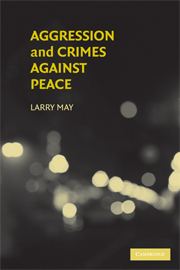Book contents
- Frontmatter
- Contents
- Acknowledgments
- PART A PACIFISM AND JUST WARS
- PART B RETHINKING THE NORMATIVE AD BELLUM PRINCIPLES
- PART C THE PRECEDENT OF NUREMBERG
- PART D CONCEPTUALIZING THE CRIME OF AGGRESSION
- 10 Defining State Aggression
- 11 Act and Circumstance in the Crime of Aggression
- 12 Individual Mens Rea and Collective Liability
- PART E HARD CASES AND CONCLUDING THOUGHTS
- Bibliography
- Index
11 - Act and Circumstance in the Crime of Aggression
Published online by Cambridge University Press: 13 November 2009
- Frontmatter
- Contents
- Acknowledgments
- PART A PACIFISM AND JUST WARS
- PART B RETHINKING THE NORMATIVE AD BELLUM PRINCIPLES
- PART C THE PRECEDENT OF NUREMBERG
- PART D CONCEPTUALIZING THE CRIME OF AGGRESSION
- 10 Defining State Aggression
- 11 Act and Circumstance in the Crime of Aggression
- 12 Individual Mens Rea and Collective Liability
- PART E HARD CASES AND CONCLUDING THOUGHTS
- Bibliography
- Index
Summary
In this chapter and the next, I will discuss conceptual and normative problems in the additional elements, other than State aggression, that must be proved to hold individuals liable for the crime of aggression. The central concern will be with the objective and subjective elements that the prosecution needs to prove to link an individual defendant's act and state of mind to the State aggression and therefore to make the individual person liable for what the State has done in waging aggressive war. In international criminal law it is individuals, not States, who are in the dock, and yet the crimes that are alleged are those that only States or other groups can commit. Concerning the crime of aggression, there are even larger problems than in other international crimes in order for trials to proceed. In the crime of aggression, the acts that individuals commit are not themselves criminal: they are only criminal because they are part of the initiation of illegal war. In the current chapter, I attempt to solve this problem, but along the way I indicate how difficult the problem is and why it will often be very hard for individual prosecutions to go forward except against the highest-ranking State leaders.
There is both a conceptual and normative question about how we link the act of an individual person to State aggression in a criminal trial. The conceptual difficulty taken up in this chapter is that one individual cannot wage war.
- Type
- Chapter
- Information
- Aggression and Crimes Against Peace , pp. 229 - 249Publisher: Cambridge University PressPrint publication year: 2008



